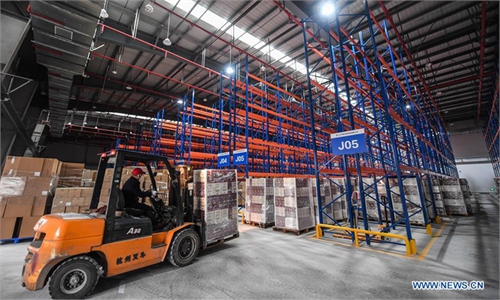Chinese vendors rush to fill Christmas orders as freight rates slide
Vendors ramp up production as freight rates slide

A Yemeni trader selects teapots while communicating with his Saudi Arabian client via video link at the Yiwu International Trade Market in Yiwu city of east China's Zhejiang Province, Jan. 14, 2021. (Xinhua/Huang Zongzhi)
Christmas product sellers across China are ramping up production to make a final sprint before the Christmas season, as shipping freight rates have fallen by more than 20 percent in two weeks, Chinese vendors and logistics companies told the Global Times on Sunday.
The average cost for shipping a 40-foot container from China to US West Coast dropped by 22 percent from late September to $16,004 last week, the fourth consecutive weekly drop, according to Freightos.
Due to the reduced shipping rates last week, Christmas vendors in Yiwu, East China's Zhejiang Province began ramping up production at the last minute to get toys and decorations onboard, to make up for disappointing sales last year.
"The freight rates fell so sharply during the National Day holidays that vendors are ramping up production and even starting to take new orders. We receive inquiries every day on container bookings," Yang Jiang, a manager at Ningbo Bonfon International Logistics Co, told the Global Times on Sunday.
"As the shipping rate falls, many customers have come to us for goods. We are also stepping up production to pack up unsold stock from last year," a manager surnamed Li, who works at a Christmas product factory in Yiwu, told the Global Times on Sunday.
According to the Xinhua News Agency, four-fifths of the world's Christmas decorations are exported from Yiwu.
In 2020, Yiwu's Christmas product sales more than halved from previous levels, as clients halted placing orders amid the uncertainty of the COVID-19 pandemic. This year, however, orders started to rebound, and Yiwu's Christmas product orders surged by 20 percent on a yearly basis, Cai Qinliang, secretary-general of the Industry Association of Christmas Supplies in Yiwu, told the Global Times on Sunday.
These shipments will be on a tight schedule to reach the US before Christmas, vendors said, though they are still making last-minute efforts.
"Currently, it takes more than 50 days for goods to reach the shore of the US, more than 10 days longer due to the extended waiting times at US ports," Yang noted. "We are still taking orders for Christmas and making every effort to deliver them before Christmas," he said.
The drop in the shipping rates is mainly due to the reduction of exports caused by the power crunch and logistics agencies that hoarded container slots have had to cut freight rates to fill these ships, Zheng Jingwen, a research fellow at the Shanghai International Shipping Research Center, told the Global Times on Sunday.
Although US logistics companies have pledged to use more overnight workers and run 24/7 to move cargo at the Port of Los Angeles, there's still a large jam.
"Ships that have been stuck for more than five days still total 25 percent of the total on the West Coast of the US, nearly five times as many as before the pandemic," Zheng said. "With a strong demand for consumer products, and COVID-induced disruptions at US ports, the shipping rate may rise again in the short term," Zheng said.
China-US trade volume grew 35.4 percent from January to September in dollar terms from last year, Chinese customs statistics revealed on Wednesday.
Although the expansion was slightly slower than the 36.6-percent growth in the first eight months, bilateral trade still hit $543 billion from January to September.
China's exports to the US may increase in the fourth quarter as the US need Chinese products to meet consumer demand, Cong Yi, a professor at the Tianjin University of Finance and Economics, told the Global Times.
"Decoupling of the two countries is unrealistic. Competition between the two countries is inevitable, but cooperation is the basic pattern," Cong said.


